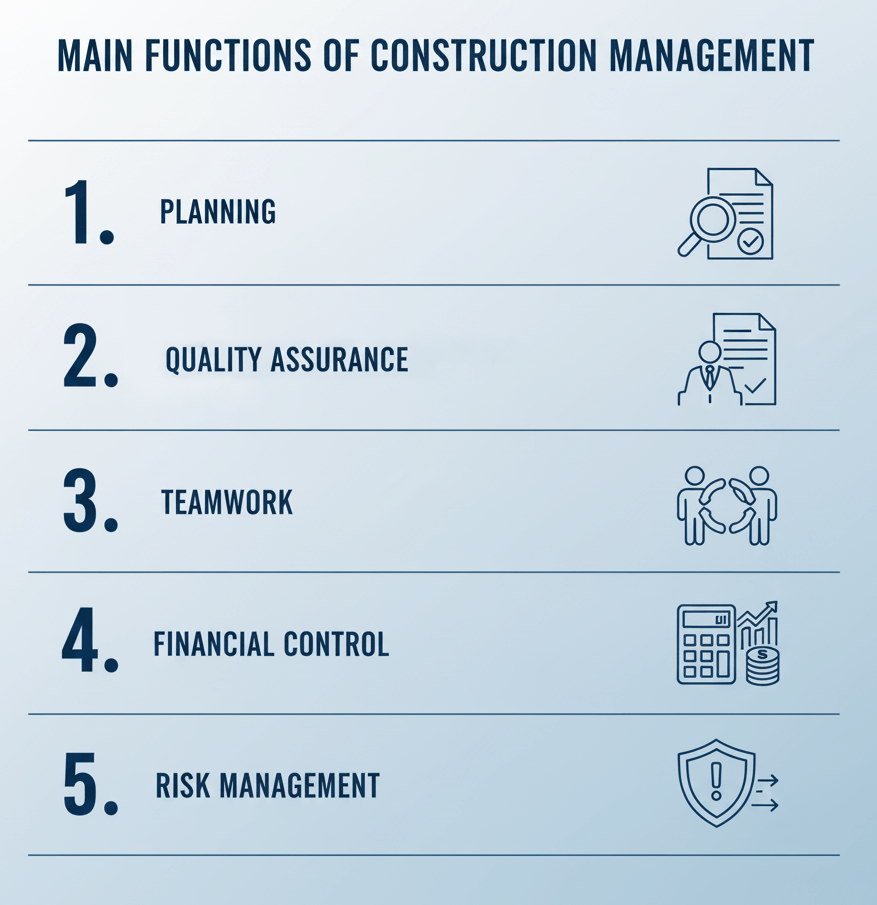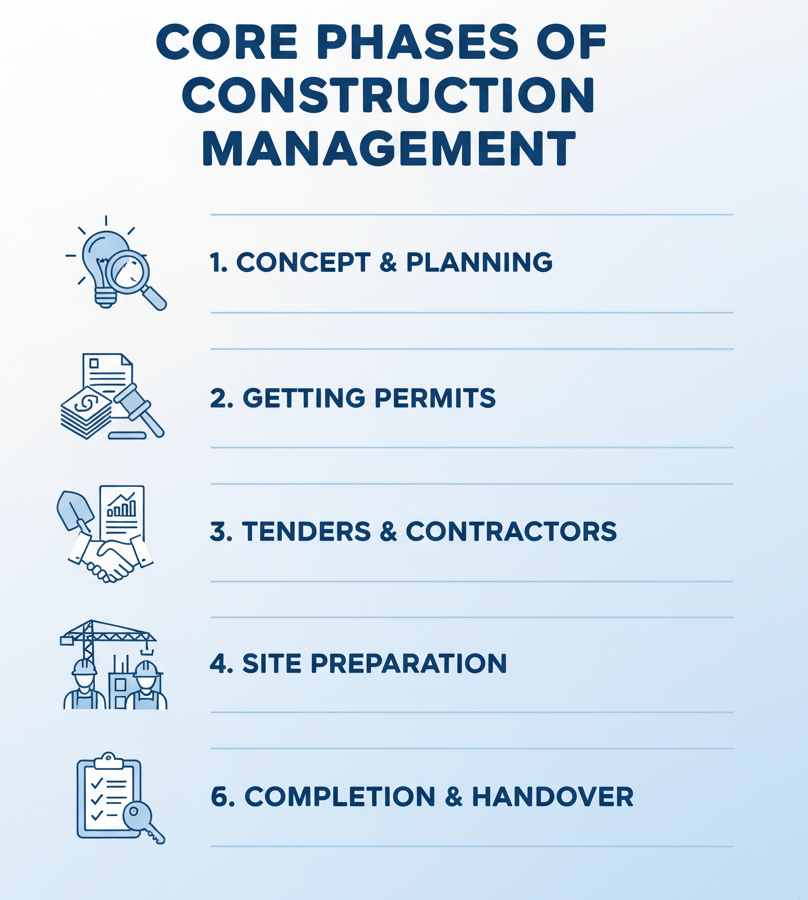The construction industry brings together a wide range of managers and specialists. Growing competition, new technologies, and complex customer requirements create new challenges for them.
These conditions demand high professionalism and strong administrative skills. To keep pace, companies must clearly understand the key functions and stages of construction management.
We outline them below.
Main functions of construction management
Construction management relies on consistent and structured processes. It includes five key functions:

1. Planning
Planning covers all preparatory activities, from analyzing technical specifications to creating a work schedule. At this stage, managers and teams shape the concept of the future project, define milestones, and identify the critical path. Planning also includes risk analysis, backup scenarios, and resource assessment.
Furthermore, it’s important to select an appropriate online management tool. For example, you can explore and choose project scheduling software for construction in this article.
2. Quality assurance
Quality control is a continuous process. It requires regular inspections, verification of technological processes, and checking whether materials meet technical standards.
A well-organized quality system prevents defects and helps streamline processes. It works best when integrated into the overall workflow instead of being handled separately.
3. Teamwork
Team management and creating a positive work atmosphere are also key in construction.
Each project involves a variety of specialists who work in various disciplines, from foremen to workers. Therefore, it’s important for managers to be able to coordinate all interactions.
When organizing team communication, it’s also important to consider the seasonality of certain types of work, which often impacts staff turnover. As a result, companies frequently attract temporary subcontractors.
4. Financial control
No construction project can move forward without proper funding. Budget management requires careful accounting, expense planning, and preparation for possible deviations from the financial plan. Managers should also create financial reserves to protect against risks.
5. Risk management
Risks in construction come from many sources, including technical issues. Managing them involves assessing the likelihood of risks and their potential impact. Every manager must also ensure occupational safety and smooth operations. This includes regular staff training and strict compliance with safety regulations.
To ensure these construction functions produce good results, all the key phases of a typical construction project must be properly followed.
Let’s explore these phases.
Core phases of construction management
A construction project begins with an idea and ends with completion, but the process also includes several important intermediate phases.

1. Project initiation and concept development
Initial planning lays the foundation for any construction project. It requires meticulous attention to even the smallest details.
During this stage, managers thoroughly analyze their clients’ needs, survey a site, and develop a shared vision for the future project. This stage also includes the creation of technical specifications that reflect the expectations of all stakeholders.
At this phase, a project team is formed. Roles and responsibilities are assigned to all participants.
2. Getting permits
This phase turns ideas and concepts into certain working drawings and technical plans. It typically involves the development of architectural solutions, engineering systems, and structural elements of the future project.
Along with the design process, all necessary permits from government agencies must be obtained. This means that managers should have a thorough understanding of the entire regulatory framework and be able to effectively interact with various authorities.
3. Conducting tenders and selecting contractors
The selection of contractors and suppliers is another important stage of construction. To achieve this, the entire team should be able to evaluate bids and have a professional approach to collaboration.
Perhaps the most routine processes occur during this phase, as managers must prepare all technical specifications for various types of construction work. They define criteria for evaluating potential contractors and strive to create a competitive environment.
Tender preparation is an important procedure during this phase. It is crucial to thoroughly analyze the reputation and experience of potential contractors and evaluate the received price proposals.
4. Site preparation
The site preparation phase lays the foundation for the successful implementation of a project. At the beginning of this phase, workers clear the area of debris. They conduct engineering and geological studies of soil conditions and groundwater levels.
The area is leveled, the axes of the future structure are marked, and key structural components are secured. Team members build temporary roads and access ways for construction equipment, as well as storage areas for materials.
It’s also important to arrange temporary power and water supplies.
5. Installation
Installation work involves the most critical and responsible processes. Therefore, managers must be constantly on guard, overseeing numerous parallel and sequential procedures.
At this stage of construction, it’s crucial to synchronize the work of all teams and ensure the uninterrupted supply of materials and equipment to the site. Modern work progress monitoring software can help with this.
It will allow for real-time monitoring of plan compliance and the identification of threats.
6. Completion of construction
At this stage, the entire team summarizes the results. All installation work is completed, and all necessary testing is carried out. After this, managers can hand over the site to a client.
It’s key to ensure the timely inspection of all engineering systems and the preparation of the necessary documentation. If this stage goes well, the team receives permission to commission the facility. That’s it.
From concept to implementation: make construction management simple and clear
Effective construction management is a harmonious combination of all the functions described at each stage of implementation. The modern construction industry requires not only technical knowledge but also developed strategic thinking skills and the ability to adapt to a rapidly changing environment.
The digital transformation of the industry opens up new opportunities for improving the efficiency of construction project management, while simultaneously increasing the demands on specialist competencies.
Consider the specifics of each phase and ensure continuous management influence for the success of your construction projects.












